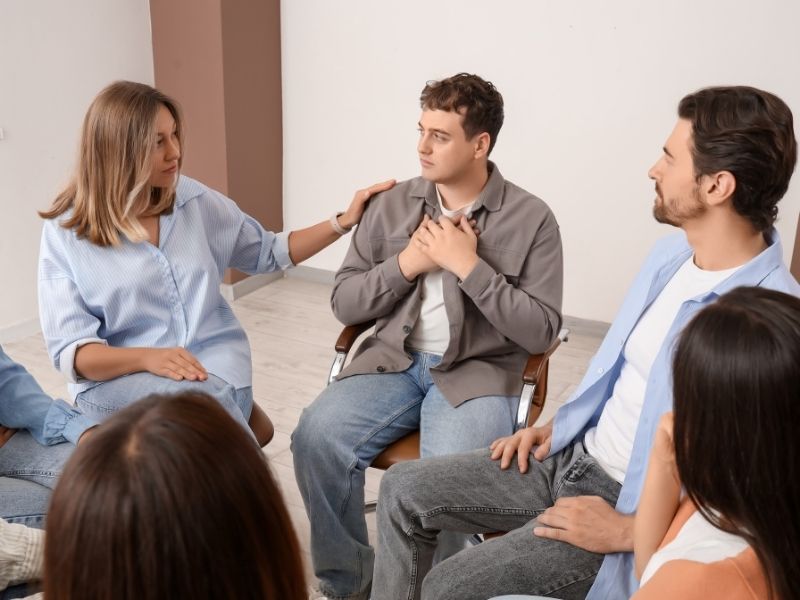Recovery is possible
Addiction Helper is an integral part of UKAT Group’s Recovery Network, providing trusted information, guidance, and support for individuals seeking help with addiction. We believe that with the right help and support, anyone can successfully overcome their addiction and go on to lead a clean and sober life. Our goal is to provide clear, accurate, and supportive information to those struggling with addiction and their loved ones, helping them take the first step towards recovery.
UK Addiction Treatment Centres (UKAT) is one of the UK’s leading providers of private addiction treatment, operating eight CQC-regulated clinics across the country. These facilities offer comprehensive, evidence-based treatment programmes tailored to meet each individual’s unique needs. With a team of dedicated medical professionals, therapists, and support staff, UKAT is committed to delivering high standards of care in a safe, welcoming environment.
We provide treatment for a range of addictions, including alcohol addiction, drug addiction (such as cocaine, heroin, and prescription drugs), gambling addiction, and behavioural dependencies. Our programmes include inpatient rehab, one-to-one therapy, group therapy, and holistic treatments, ensuring a comprehensive approach to long-term recovery.
Our commitment doesn’t end when treatment does. We also offer aftercare and ongoing support to help individuals stay on track and maintain their recovery journey long after they leave our clinics. Recovery is a lifelong process, and we understand that sustained support is essential for long-term success. That’s why we provide continued access to therapy, relapse prevention resources, and community-based support networks. By addressing both the physical and psychological aspects of addiction, we aim to empower each person to build a healthier, more fulfilling future — not just free from addiction, but rich in purpose, stability, and self-belief.
Direct Admissions with UKAT
UKAT manages all communications in-house, ensuring that individuals receive direct, accurate, and transparent guidance from our experienced admissions team. Our team members have either extensive experience in addiction support, have been through recovery themselves, or have helped a family member on their journey.
When discussing treatment options, we will always explore whether a UKAT rehab facility is the right fit for you. However, we understand that everyone’s journey is unique, and if we feel that another service may better suit your needs, we will gladly refer you to a trusted alternative. We do not receive any fee for referrals—we do this solely to ensure you receive the best possible support for your recovery and maintaining full control over the quality of care we offer. Our mission is to help you find the best path, whether that’s with UKAT or elsewhere.
NOTE: While Addiction Helper is part of the UKAT Group’s Rehab Network, this site also lists other rehab facilities for informational purposes. Clients may choose to contact these facilities directly if they wish. However, please note that some details may be outdated or subject to change, and we recommend conducting a local search to obtain the most up-to-date information.
and need help
Rehab for alcohol addiction
Rehab for drug addiction
What are the options?
and I don’t know what to do
Support for a family of an addict
My teenager is struggling with drug addiction
How to help someone who is refusing treatment
Get answers to your questions about rehab
Choosing a rehab facility can be a challenging process as there are many important points to consider. Preparing a list of questions to ask the rehab placement director might help you make an informed decision and enter the most appropriate programme. Things to consider when seeking rehab include:
- Programme cost and health insurance coverage.
- Distance from home, family, and loved ones.
- Length of stay and treatment plans.
- Facility rules and restrictions.
- Amenities such as rooming, meal options, and recreational items.
Finding the ideal treatment centre means finding the perfect, personalised treatment programme for your own situation. No one-size-fits-all.
Addiction affects all communities
Hundreds of thousands of people across the UK are currently suffering with some form of substance or behavioural addiction. This issue is far more widespread than many realise, affecting individuals in every corner of the country. From small rural villages to large urban centres, addiction continues to impact lives, often in silence.
Contrary to popular belief, addiction is not an illness confined to any one type of person. It doesn’t discriminate based on background, gender, age or race. Addiction can affect absolutely anyone — from all walks of life, in any social or economic situation. It’s not a reflection of weakness, nor is it something that only happens to “other people.” Understanding this is crucial in reducing stigma and helping more people access the support they need. The truth is, anyone can struggle with addiction, and everyone deserves compassion, understanding and access to help.
Learn About Treatment Types
There are various treatment methods used, usually in conjunction with one another, during the recovery process. Treatment programmes will differ for each individual and will be tailored to suit their unique needs and situations. The most effective types of treatment programmes ensure that individuals in recovery are actively involved every step of the way.
When an individual decides to get sober, they are committing to a life of abstinence, meaning no engaging in addictive behaviour or abusing any substances.
Sometimes, a planned intervention conducted by friends and family and a counsellor or addictions professional is the focused approach needed to set an addicted person on the road to recovery.
Detoxification is the process by which the body clears itself of drugs, and is designed to manage the acute and potentially dangerous physiological effects of stopping drug use.
Rehab is a treatment programme that is provided in a residential setting. Rehabs are usually abstinence-based and provide an intense programme of support and care for those that need it.
Addiction treatment therapies include (but are not limited to) Behavioural Therapy; Cognitive-Behavioural Therapy (CBT) and Dialectical Behaviour Therapy (DBT).
Extended care drug rehabilitation may be several things. It may incorporate extended stays at treatment facilities that exceed 30-, 60-, 90-day cycles. It may also refer to post-treatment care.
Group therapy is often offered in conjunction with individualised drug counselling and is formatted to reflect the principles of cognitive-behavioural therapy and contingency management.
Providing the physical and psychological support needed to beat substance dependency. These include inpatient and outpatient recovery programmes, and support groups.
This is a vital part of the recovery programme, as addicts are prone to relapse in early recovery. Therefore, it is important they learn how to deal with signs of relapse and how to prevent it.
Choosing the right addiction treatment option can feel like a daunting task, especially if you don’t know where to start. Whether you opt for a private rehab facility, addiction counselling or a 12-step programme, it’s important to know that you have seriously considered all of the options available to you, and made an informed decision on what is best-suited to your needs. Below you will find a range of treatment services available by county, so you can choose how and where you begin your journey to recovery.
Select a County to Find Addiction Treatment
- Bedfordshire
- Berkshire
- Bristol
- Buckinghamshire
- Cambridgeshire
- Cheshire
- Cornwall
- County Durham
- Cumbria
- Derbyshire
- Devon
- Dorset
- East Sussex
- East Yorkshire
- Essex
- Gloucestershire
- Greater Manchester
- Hampshire
- Herefordshire
- Hertfordshire
- Isle Of Wight
- Kent
- Lancashire
- Leicestershire
- Lincolnshire
- London
- Merseyside
- Norfolk
- North Yorkshire
- Northamptonshire
- Northumberland
- Nottinghamshire
- Oxfordshire
- Shropshire
- Somerset
- South Yorkshire
- Staffordshire
- Suffolk
- Surrey
- Tyne And Wear
- Warwickshire
- West Midlands
- West Sussex
- West Yorkshire
- Wiltshire
- Worcestershire




